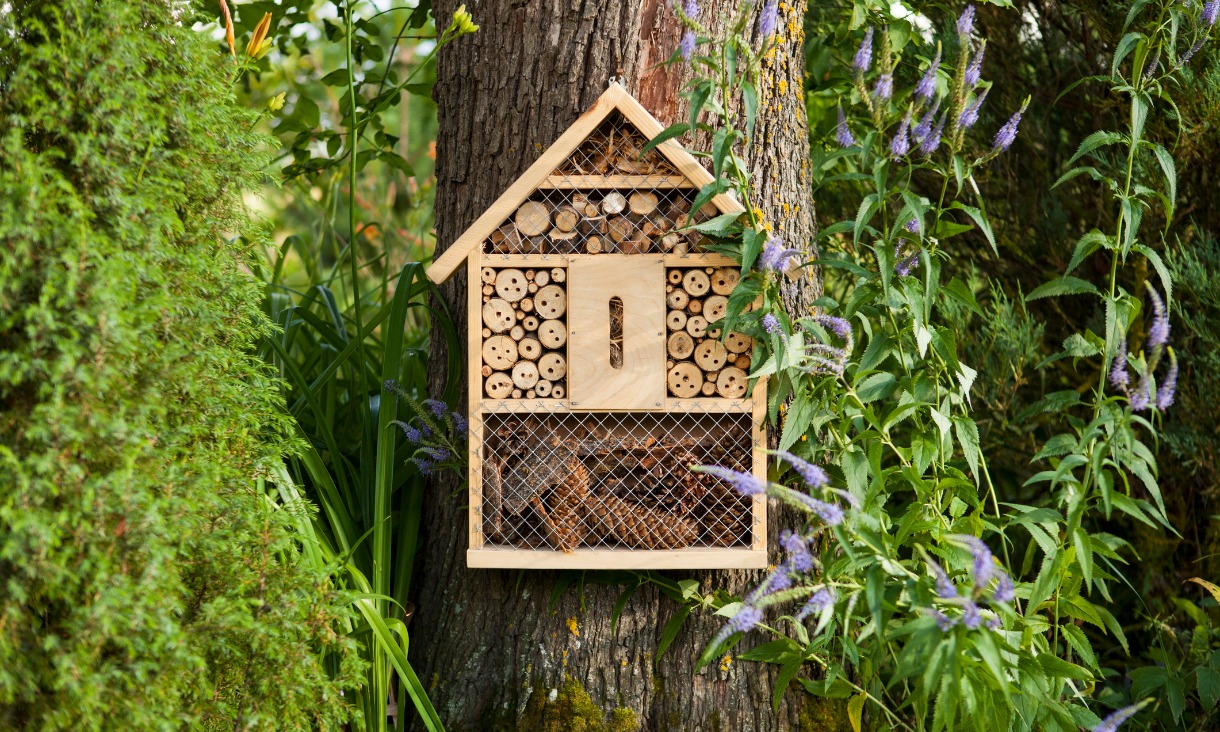
Fostering biodiversity on World Environment Day
Experts from RMIT University are available to talk to media on topics relating to World Environment Day on 5 June including gardening for wildlife, sustainable dressing, and fashion’s environmental impact.
 Making a bee hotel gives solitary native bees somewhere to rest and breed
Making a bee hotel gives solitary native bees somewhere to rest and breed
Biodiversity conservation in your backyard
Dr Laura Mumaw (0409 156 935 or laura.mumaw@rmit.edu.au)
Topics: nature stewardship, wildlife gardening
“We can all foster the special plants and animals native to our neighbourhoods – at home, school, and work – from cities to backblocks.
“Improving habitat on your balcony or in your garden – gardening for wildlife - provides food, shelter and corridors for native plants, insects, birds and mammals, linking plots of land into a nourishing landscape. Our latest Australian conservation strategy promotes it.
“You can add water features, make bee hotels and lizard shelters, layer shrubbery, remove environmental weeds, and plant species from your local indigenous nursery. Most importantly, watch, enjoy and record your garden visitors.
“Wildlife gardening programs that partner community members with local government build stewardship ethic and skills, community connections, personal wellbeing, and hope for the future.
“Linking these programs across councils and shires – like the Gardens for Wildlife Victoria network – expands the scale, impact, and innovation of wildlife gardening.”
Dr Laura Mumaw is a Vice-Chancellor’s postdoctoral research fellow working in the Centre for Urban Research at RMIT University and serves on the steering group of Gardens for Wildlife Victoria. A conservation practitioner of 35 years and previously CEO of Zoos Victoria, Dr Mumaw’s research focuses on biodiversity stewardship, urban nature and wellbeing, and how cities can improve their social and ecological wellbeing through new human-nature relationships and understanding.
Sustainable dressing
Tamzin Rollason (0433 552 441 or tamzin.rollason@rmit.edu.au)
Topics: sustainable fashion, sustainable dressing, eco-style trends, sustainable consumption
“The contribution of the fashion industry to land use, water consumption, chemical pollution, greenhouse gas emissions and waste is attracting increasing, though long neglected, scrutiny.
“As one of the most polluting and waste producing industry sectors globally, the impact of the fashion industry is significant for future wellbeing.
“As awareness and criticism of the fashion industry has increased, production has begun to include sustainable design innovations that use cleaner and more efficient resources.
“Despite this, the environmental impact of the industry has continued to increase as garments become cheaper and trend cycles shorter.
“Quantities of textiles waste are increasing so much that recycling markets in developing countries are overwhelmed with our clothing waste.
“In keeping with Sustainable Development Goal 12, sustainable production and consumption, there is an urgent need to focus on different approaches to the production, use and disposal of fashion.
“During the COVID-19 slowdown of our lives, the way we wear and use clothes has been very different. This provides an opportunity to consider a new relationship with the clothes in which we present ourselves to the world.”
Tamzin Rollason is a PhD researcher at the RMIT Centre for Urban Research. Her research investigates how clothing and garments are managed and used in outfit making, laundering, care and disposal for people who are engaged in sustainable lifestyles. She previously worked in the not-for-profit environment sector in household waste reduction and as an environmental educator.
Reducing fashion’s environmental impact
Dr Stephen Wigley (0427 341 322 or stephen.wigley@rmit.edu.au)
Topics: fashion economies, product management, fashion marketing and retail, global value chains and luxury brands
“Many fashion companies have been badly affected by the COVID-19 crisis and therefore many will be focused purely on commercial survival and profitability, which may mean their environmental and sustainability initiatives are put on the back shelf for a while.
“But with every crisis there is also an opportunity, and consumers are aware now more than ever of the environmental challenges we face and are willing to support organisations that make genuine efforts to address them.
“At the same time, the crisis has provided impetus for innovation in how fashion products are made and distributed.
“Breakthroughs in materials technology and in fabric treatments and dying can reduce the environmental impact of manufacturing, while whole business models and supply chains have been forced to become more efficient.
“The biggest environmental – and economic – boost for the Australian fashion industry would be for initiatives to support the localisation of manufacturing.
“We are a country of innovators and we are leading the world in terms of developing new production methods, processes and business models that can make a fashion company not just profitable, but a good citizen of Australia and the World.”
Dr Stephen Wigley is Associate Dean for Fashion Enterprise in the School of Fashion and Textiles. His research focuses on the corporate and creative strategies of fashion businesses as they respond and seek to shape emerging consumption patterns, new technologies, and social and environmental challenges. With a background in marketing and brand management roles for US and European fashion businesses, Stephen has presented research and contributed to fashion business media worldwide, taught in the UK, Europe, and Australia and consulted with leading consumer-facing brands.
For media enquiries, please contact RMIT Communications: 0439 704 077 or news@rmit.edu.au
- Sustainability
- fashion
- Environment
Acknowledgement of Country
RMIT University acknowledges the people of the Woi wurrung and Boon wurrung language groups of the eastern Kulin Nation on whose unceded lands we conduct the business of the University. RMIT University respectfully acknowledges their Ancestors and Elders, past and present. RMIT also acknowledges the Traditional Custodians and their Ancestors of the lands and waters across Australia where we conduct our business - Artwork 'Sentient' by Hollie Johnson, Gunaikurnai and Monero Ngarigo.